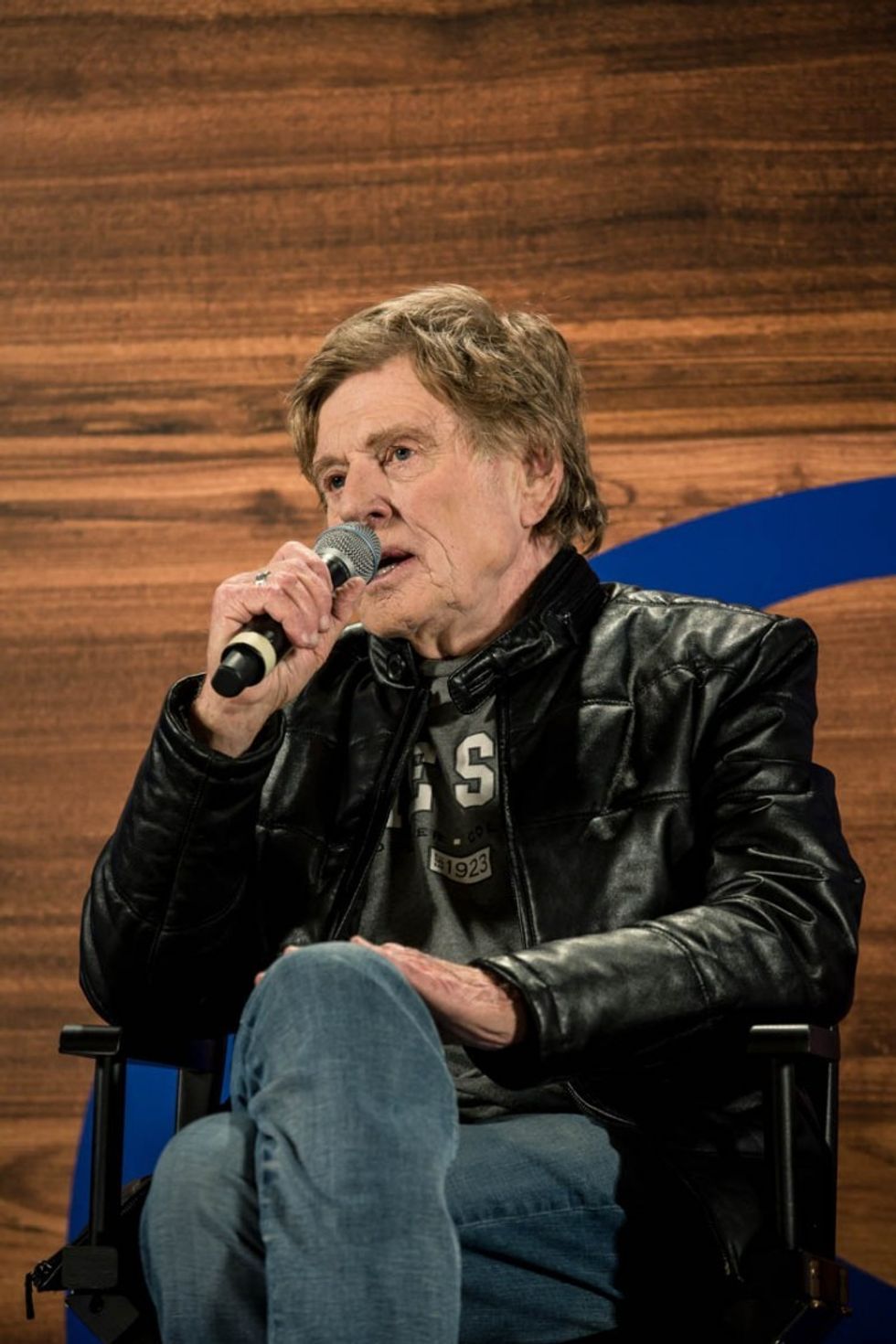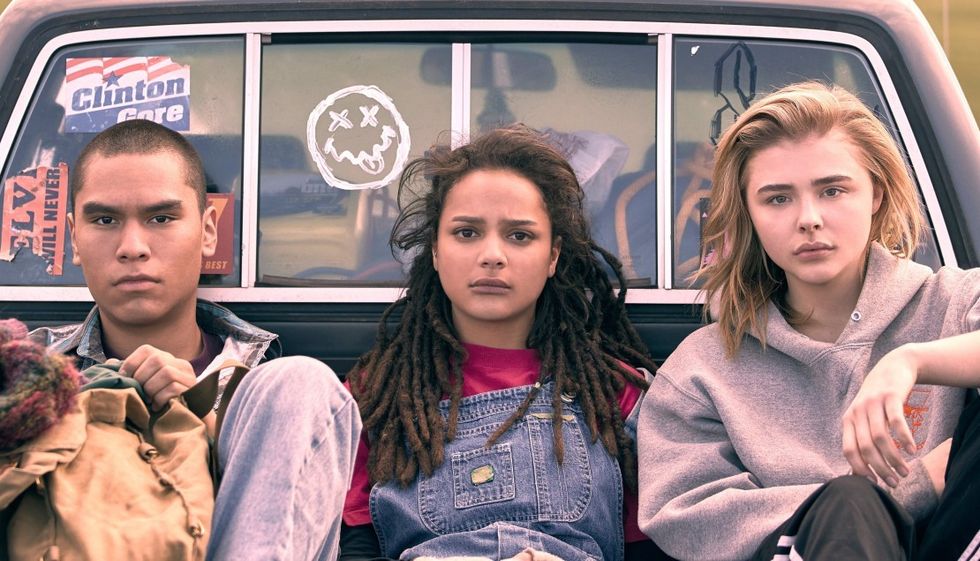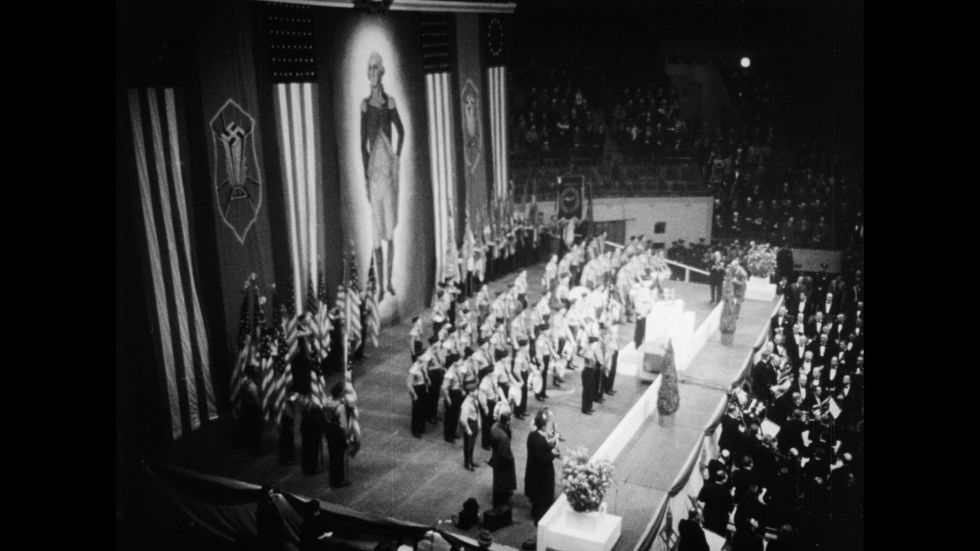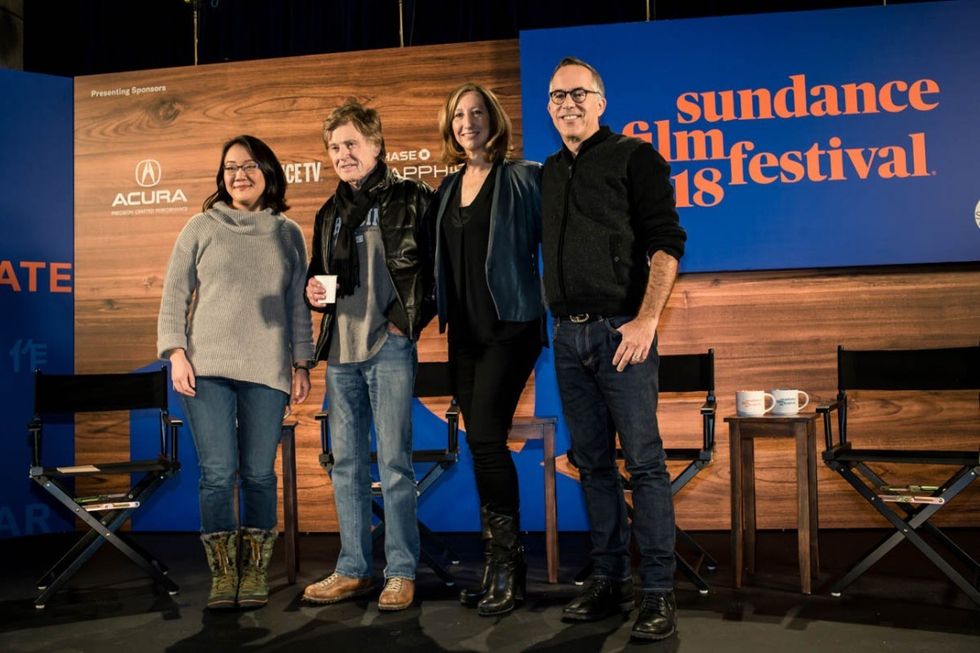The Sundance Film Festival in the Age of #MeToo and Time's Up
The festival's leadership addressed the cultural challenges consuming the film industry and society as a whole, and the role of Sundance in forging a better future.

It was the calm before the storm. The festival’s champions entered the arena, primed for controversy: President and Founder Robert Redford, Executive Director of the Sundance Institute Keri Putnam and Festival Director John Cooper. A crush of press flocked in, questions locked and loaded. What is Sundance doing about #MeToo? What role does art play in fake news? What about Harvey Weinstein? Echoes of Christopher Nolan’s fictional press conference in The Dark Knight filled the room: “Things are worse than EVER!” Despite the onslaught, the Sundance triumvirate was smooth and steady. And full of hope. Here are their choice observations about the year to come.
Embrace change
Positive change has kept Sundance afloat for the past 35 years. And for everyone from industry-vets to industry-hopefuls, forward movement matters more now than ever. After the second Weinstein question of the day, Cooper shot back, “I’m sick of Harvey, we’re past Harvey, we’re onto change.” Redford concurred: “Weinstein was a moment in time. It’s not gonna stop the show.”
“Now is the time for women to exercise their voices more and more. The role for men right now is to listen. To think.” — Robert Redford

“Sundance this year is a bit of a ground zero,” Cooper said. “When you form a community, you have to form an experience that feels safe. So we updated our code of conduct this year.” In partnership with Utah’s Attorney General, Sundance is providing a 24-hour live hotline for anyone involved in or witness to an incident. This message was included front and center with all attendees’ badges.
“Change is inevitable. It will come,” assured Redford. “Now is the time for women to exercise their voices more and more. The role for men right now is to listen. To think.” Sundance’s resident female-in-charge Keri Putnam nodded her approval, adding, “The problem exists in the underlying systems of power. For us, that means we need to examine those structures: our assumptions, who gets financing, distribution, who gets to tell the stories, what stories we tell. We’re not going backwards from here, but it’s gonna require a lot of effort, pressure and conversation.”
What will the topics be? Awareness. Risk-taking. Openness to change. The Sundance staff has taken a stance of controlled hopefulness, pushing positive change as a theme for the festival—and for the industry at large. No surprise there: just one year ago, protestors lined the streets of Park City for the worldwide Women’s March. And at last year’s press conference, the day before Trump’s inauguration, Redford was eloquent. “People who weren’t interested are starting to realize that they’re directly affected,” he stated last year. “I hope and think this will be followed by a movement.” He was right.
Since then, we've witnessed the rise of the #MeToo and Time's Up coalitions. Individuals are finding their voice. Long-held secrets are being shared. Industry tides are finally turning toward tangible progress. Slowly but surely, inequity is being addressed, and Sundance has proof: this year’s stats include 38% female directors, 32% directors of color. As Putnam reminds us, “It’s not where we need to be, but it’s progress.” And if history is any indicator, the best parts of these efforts will snowball and momentum will build. As long as we don’t get complacent.

Story can change the world
Art is often a mirror of our cultural maladies: bias, harassment, aggression, ignorance. But more often than not, it is also a salve. Even in this era of overt untruths—with journalism under siege—Sundance believes that the stories showcased at the festival will help. “Representation in media has a multiplier effect on culture,” Putnam explained. “What we dream up and put on our screens shows what we value as a society. And in turn, what we see in our media can help counter bias and harassment.”
Cooper nodded fervently. “I truly believe you can only change the world through story. Not through arguments or political agendas. Getting real people to have real feelings about these subjects. That’s why I do this job.”
“We need to examine...our assumptions: who gets financing, distribution, who gets to tell the stories, what stories we tell.” — Keri Putnam
As usual, this year’s slate offers a slew of relevant, diverse stories. Among them: Boots Riley’s alternate-reality, anti-establishment shotgun blast Sorry to Bother You; Desiree Akhavan’sThe Miseducation of Cameron Post, a coming-of-age odyssey set in a gay conversion therapy center; Sebastian Silva’s Tyrel, already creating buzz as a potential companion piece to Get Out. (That’s a statement worth noting: a year ago, it seemed astounding that Get Out could get made.) There’s also Dark Money, Kimberly Reed’s doc about anonymous election funding, and Stephanie Soechtig’s The Devil We Know, about Teflon chemical leaks in West Virginia. And that’s just the beginning.
Per the programmers, the changes we’ll see at this year’s Sundance reflect legitimate changes to the system. People are making and financing new kinds of movies. Cooper cited A Night at the Garden, a short doc by Marshall Curry about a 1939 Nazi Rally in New York that has in-your-face parallels to the present day. “To me, THAT is more powerful than a three-hour doc about everything going wrong today,” he enthused.

“And that’s the value of art.” Redford was equally fervent. “The role of art in society is to describe and critique. It boils down to two points: what is working the way it should; what’s not working the way it should.”
Start your own conversation
Perhaps the best news is that you can make a difference.
Putnam declared her own amazement at how, year after year, audience engagement drives the festival—and revitalizes the film culture surrounding it. “I am blown away by the conversations started at Sundance: in lines, at restaurants, in theaters. It’s not just up to the artist and the industry to diversify. It’s possible for us as a community to be ambassadors, amplifiers, champions for unheard voices.”

Redford agreed emphatically. “This festival is a two-way street. In the early years, I underestimated the value of the Sundance audience. Until someone told me, ‘I come here because I know this is a safe place. I’m allowed to make mistakes, to push myself, take chances.’ To me, hearing that was everything.”
Sundance isn’t a mechanism for control; it’s an incubator and a catalyst. It’s both a safe space and a vehicle for change. It’s the hordes of film lovers, truth-tellers, loud voices and fearless creators who lead the charge toward change.
The rest is up to you.
For more, see our ongoing list of coverage of the 2018 Sundance Film Festival.
Featured image: Moderator Barbara Chai, Sundance Institute President & Founder Robert Redford, Sundance Institute Executive Director Keri Putnam and Sundance Film Festival Director John Cooper at the Day One Press Conference of the 2018 Sundance Film Festival. Courtesy of Sundance Institute | photo by Duston Todd.














